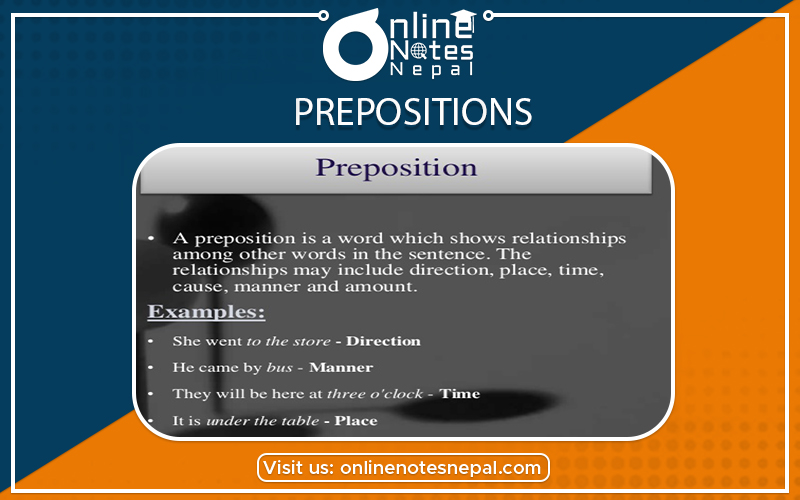Prepositions
Prepositions are a word that shows the relations between a noun or a pronoun and some other word in a sentence. It is placed before the noun or the pronoun.
Prepositions are short words (on, in, to') that usually stand in front of nouns (sometimes also in front of gerund verbs). They help in describing time, position, direction, and phrases.
Prepositions of time
A number of prepositions may be used to denote time: on Monday, before night, during the night, till tomorrow, afterlunch.
- At, on, in
(a) At' usually denotes a definite point of time but can also be used for indefinite periods:
at 3 o'clock, at midnight
(b) On is used with days and dates:
on Monday, on 5th December
(c) In' is used with parts of the day, month, year, season:
in the morning, in winter
- By
It denotes the latest time at which an action will be over:
The show will be over by 6 p.m.
- From
It denotes the starting point of action. It is almost always used with to or till/until:
The examination will be held from 8 a.m. to 11 a.m.
Prepositions of position
- At, in
(a) At has the idea of an exact point; it is used with villages, small towns. In has an idea of a larger area and is used while speaking of bigger towns, states, countries:
at Thamel, in Kathmandu, at Dhanusha, in England
(b) It conveys the idea of the general neighborhood; in conveys the idea of something contained:
Please sit at the table when you eat.
I shall meet you at the Hotel Hyatt.
The jam bottle is in the refrigerator.
- Between, among
Between is used with two persons or things, among is used with more than two:
A small table was lying between the two chairs.
The hare hid among the bushes.
- On, upon
Both on and upon can be used while speaking of things at rest; upon is used with things in motion:
My bag is on/upon the table.
- Above, over
Both above and over mean higher than:
The flags waved over our heads.
The flags waved above our heads.
- Below, under
Both below and under mean lower than. Sometimes we can use either of them. But under also means vertically below.
The traveler was resting under a tree.
She put the book under her pillow.
There was a beautiful lake below us in the valley.
Prepositions of direction towards: to, toward, into, at, for, against
- To has the sense of destination, towards of direction:
We went to the school. (reached the school)
We went towards' the school. ( in the direction of the school)
- Into denotes movement towards the interior of something:
The dog jumped into the pond.
- At has the idea of hitting:
She threw the stone at the dog.
- For suggests the beginning of a movement:
The workers left for the factory.
- Against shows pressure or contact:
He threw the bag against the wall.
Prepositions of direction from': from, off, out of
- From is used with the point of departure:
She has already gone from the office.
- Off shows separation. It is used in the sense of from the surface of, down from:
He fell off the cycle.
- Out of is the opposite of into. It means from the interior of:
The bird flew out of the cage.
Correct use of certain prepositions
- By, with
By is used to express the agent or doer of action; with relates to the instrument with which the action is done:
The leopard was beaten by the villagers with a stick.
- After, in
After is used to denote some period of time in the past; in' is used to show some period of time in the future:
She came back home after an hour.
We will come back home in an hour.
- Beside, besides
Beside means by the side of; besides means in addition to:
Please put this bag beside the box.
Besides giving me books, she gave me her notes.
- On-time, in time
On-time = at the arranged time; not before, not after
In time = not late, with a comfortable margin:
We reached the station in time for the train.
The train started on time.
Prepositions used in idioms and phrases:
At;
not at all: not in any way
at any rate: whatever happens
at this point: at this place; at this moment
at rest: not moving
In:
in addition to: as well as
in advance: before
in tune: at the correct pitch
in a minute: soon
On:
on account of, because of
on the average: usually; normally
on fire: burning
on time: at the correct time
By:
by heart: from memory
by oneself: alone
by the way: incidentally
little by little: gradually
For:
for fun: for the sake of enjoyment
for sure: definitely
for sale: intended to be sold
for now: temporarily
Out of:
out of the blue: unexpectedly
out of danger: safe
out of trouble: not in trouble
out of hand: not under the control
